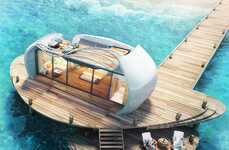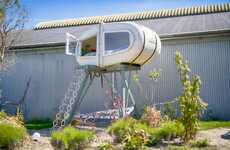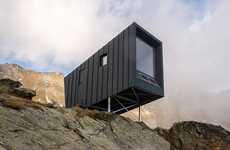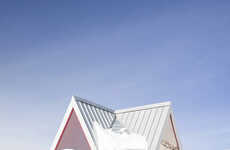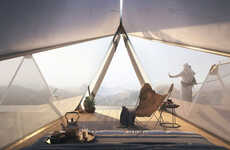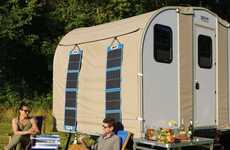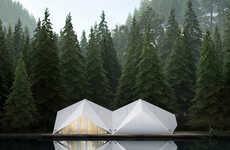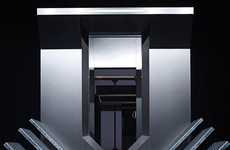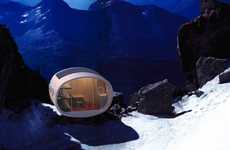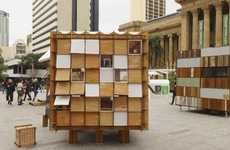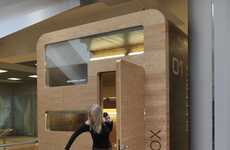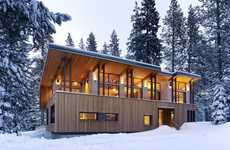
Living Ecological Alpine Pod Provides Comfort without Eco Expense
Amelia Roblin — November 11, 2011 — Eco
References: leapfactory.it & ifitshipitshere.blogspot
The majority of those with a passion for discovering Earth's most breathtaking landscapes aim to minimize the environmental impact of their activities based on a compassion for the planet. The Living Ecological Alpine Pod caters to those nature-loving adventurers who wish to see extraordinary sights and require a comfortable bed at night.
Stefano Testa and Luca Gentilcore have designed this prefabricated refuge for installation especially in remote areas of mountains, deserts and in the the far north. Assembled and fitted out completely off-site, this diligently built dwelling is guaranteed to have nearly zero effect on its local ecosystem.
The tubular Living Ecological Alpine Pod (LEAP) can be constructed in any length with the attachment of any number of unit slices. It relies on solar power for energy, employs a biological toilet and houses a kitchen, a bathroom and a bedroom with cantilevered bunk beds.
Stefano Testa and Luca Gentilcore have designed this prefabricated refuge for installation especially in remote areas of mountains, deserts and in the the far north. Assembled and fitted out completely off-site, this diligently built dwelling is guaranteed to have nearly zero effect on its local ecosystem.
The tubular Living Ecological Alpine Pod (LEAP) can be constructed in any length with the attachment of any number of unit slices. It relies on solar power for energy, employs a biological toilet and houses a kitchen, a bathroom and a bedroom with cantilevered bunk beds.
Trend Themes
1. Modular Prefabricated Shelters - There is an opportunity for building designers to create modular prefabricated shelters that have nearly zero effect on local ecosystems and rely on renewable energy sources like solar power.
2. Eco-friendly Adventure Tourism - Developers in the tourism industry can tap into a growing market of nature-loving adventurers who aim to minimize their environmental impact when discovering landscapes.
3. Renewable Energy-powered Homes - The use of renewable energy sources like solar power can be implemented in home construction, providing a sustainable solution for energy consumption.
Industry Implications
1. Sustainable Architecture - Architects and builders can focus on designing and constructing sustainable buildings that prioritize energy efficiency and employ eco-friendly materials.
2. Outdoor Recreation and Tourism - Developers in the tourism industry can take advantage of the growing trend of adventure-seeking travelers who prioritize minimizing their environmental impact while exploring outdoor landscapes.
3. Renewable Energy - Investments in renewable energy sources like solar power can provide an opportunity for growth and innovation in energy production and consumption.
6.2
Score
Popularity
Activity
Freshness

